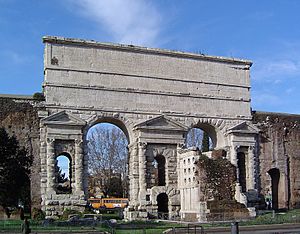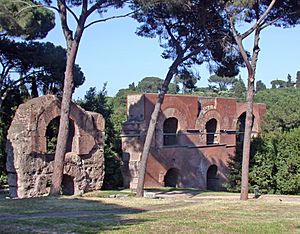Frontinus facts for kids
Quick facts for kids
Sextus Julius Frontinus
|
|
|---|---|
| Born |
c. 40 AD
|
| Died |
103 (aged 62–63) AD
|
| Nationality | Roman |
| Occupation | Engineer, author, soldier & politician |
|
Notable work
|
De aquaeductu Strategemata |
| Office | Roman consul |
| Children | 1+ |
Sextus Julius Frontinus (born around 40 AD, died 103 AD) was an important Roman engineer, writer, soldier, and politician. He lived in the late 1st century AD. He was a successful general under Emperor Domitian. He led Roman armies in Roman Britain and along the Rhine and Danube rivers.
Frontinus was a "new man" (novus homo). This means his family was not from the traditional Roman noble class. He became a Roman consul three times, which was a very high honor. He also did important jobs for Emperors Nerva and Trajan. Today, he is best known for his books, especially De aquaeductu. This book is all about the amazing aqueducts of Rome that brought water to the city.
Contents
Frontinus's Life and Family
We don't know much about Frontinus's early life or his parents. We also don't know his wife's name. It is thought he came from a region called Narbonese Gaul. His family was likely from the equites class, which was a wealthy but not noble group. He probably had a sister. Frontinus also had at least one daughter.
His Amazing Career
Frontinus had a very busy and successful career in the Roman Empire.
Early Military Service
In 70 AD, Frontinus helped stop a rebellion in the Rhineland area. He later wrote that he accepted the surrender of 70,000 Lingones people. After this, he became a Roman consul for a short time. This was before he became governor of Britain.
Governor of Britain
A few years later, Frontinus became the governor of Roman Britain. He took over from Quintus Petillius Cerialis. While he was governor, he conquered the Silures tribe in South Wales. He also likely fought against the Brigantes tribe. In 77 AD, Gnaeus Julius Agricola took over from Frontinus. Agricola was the father-in-law of the famous historian Tacitus.
Important Roles in the Empire
Frontinus was likely with Emperor Domitian during a military campaign in Germany in 83 AD. Later, in 86 AD, he served as a proconsul in the Roman province of Asia. This was another important leadership role.
Supervisor of Rome's Water
In 97 AD, Emperor Nerva gave Frontinus a very important job. He was made curator aquarum, which means "supervisor of the aqueducts." This job was only given to highly respected people. Before him, Marcus Vipsanius Agrippa, a friend of Emperor Augustus, held this role. Agrippa had done a lot to fix and improve Rome's water system.
High Honors and Later Life
The next year, Frontinus became a consul for a second time. Emperor Trajan was his co-consul. Two years later, he became a consul for a third time, again with Trajan. This was a very special honor. It showed how much Trajan respected him. Frontinus was also a member of the College of Augurs, a group of religious officials. He passed away in 103 or 104 AD.
Frontinus's Writings
Frontinus wrote several books. His most famous works are about Rome's water system and military strategies.
Rome's Aqueducts: De aquaeductu
Frontinus's main work is De aquaeductu (meaning "On Aqueducts"). This book has two parts. It was an official report to the emperor about Rome's water supply. It tells the history and describes how Rome's water system worked. It also explains the laws about using and maintaining the water.
Frontinus wrote about all nine aqueducts that supplied Rome at that time. These included the Aqua Marcia, Aqua Appia, and Aqua Claudia. He described the size of each aqueduct. He also explained how much water they carried. He talked about the quality of the water from each source. Some water came from rivers, some from lakes, and some from springs.
Stopping Water Theft
When Frontinus became water supervisor, one of his first tasks was to map the water system. He wanted to check its condition before making repairs. He found that many aqueducts were not working at full power. He was especially worried about people stealing water. Dishonest farmers and traders would put pipes into the aqueduct channels. This allowed them to take water illegally.
To stop this, Frontinus carefully measured the water coming in and going out of each line. He then looked for differences. He also used special stamps on lead pipes. These stamps showed the owner's name. This helped prevent water theft.
The way water was shared depended on several things. These included how high the water entered the city. The quality of the water and how fast it flowed also mattered. For example, lower quality water went to gardens or for flushing. Only the best water was saved for drinking. Water of medium quality was used for the many public baths and fountains. Frontinus did not like mixing water from different sources. So, he decided to keep the water from each system separate.
Keeping the System Working
Frontinus was very concerned about leaks in the aqueduct system. Leaks in underground pipes were hard to find and fix. This is still a problem for water engineers today. The parts of the aqueducts above ground needed careful maintenance. The stone structures had to be kept in good condition. This was especially true for parts running on arches. He said it was important to keep trees far away. Their roots could damage the structures. He also reviewed the laws about the aqueducts. He made sure these laws were enforced.
Military Tactics: Strategemata
Frontinus also wrote a book about military science. This book is now lost. However, his other military book, Strategemata (meaning "Strategies"), still exists. It is a collection of clever military tricks. These examples come from Greek and Roman history. They were meant to help generals.
Frontinus used his own experience as a general in Germany. But he also used stories from other Roman writers. This suggests he got many ideas from books. One example he gives is about controlling river water during a siege:
Lucius Metellus, fighting in Hither Spain, changed a river's path. He sent it from a higher place towards the enemy's camp, which was on low ground. When the enemy panicked from the sudden flood, he had them killed by men he had hidden for this purpose.
Frontinus in Fiction
Frontinus appears as a character in several historical novels. He is in the Marcus Didius Falco series, including The Silver Pigs and Three Hands in the Fountain. He also appears in The Centurions novels, Barbarian Princess and The Emperor's Games.
See also
- Cloaca Maxima
- Dolaucothi
- Gromatici
- List of aqueducts in the city of Rome
- List of aqueducts in the Roman Empire
- List of Roman aqueducts by date
- Quinaria
- Roman aqueducts
- Roman conquest of Britain
- Aggenus Urbicus
Images for kids




